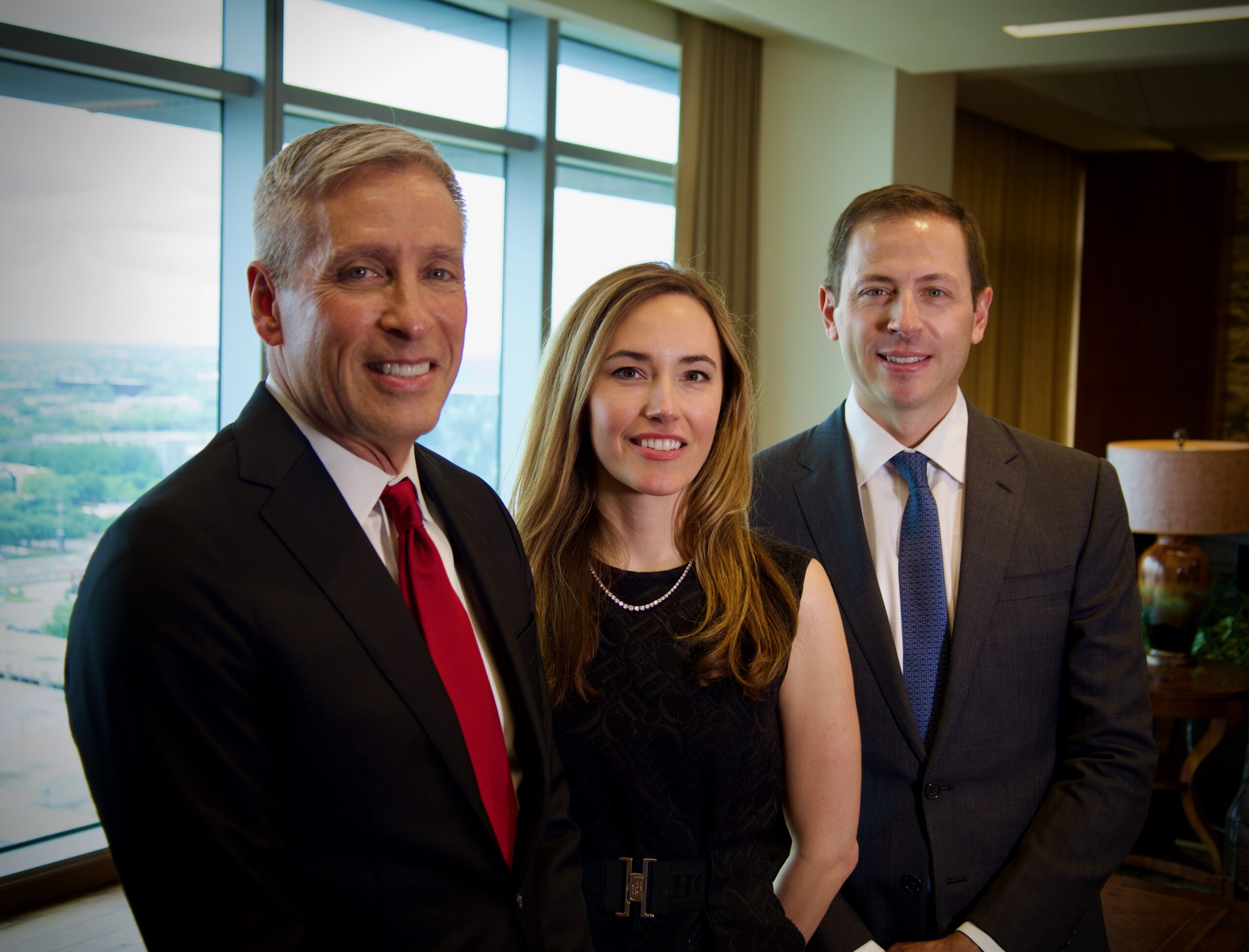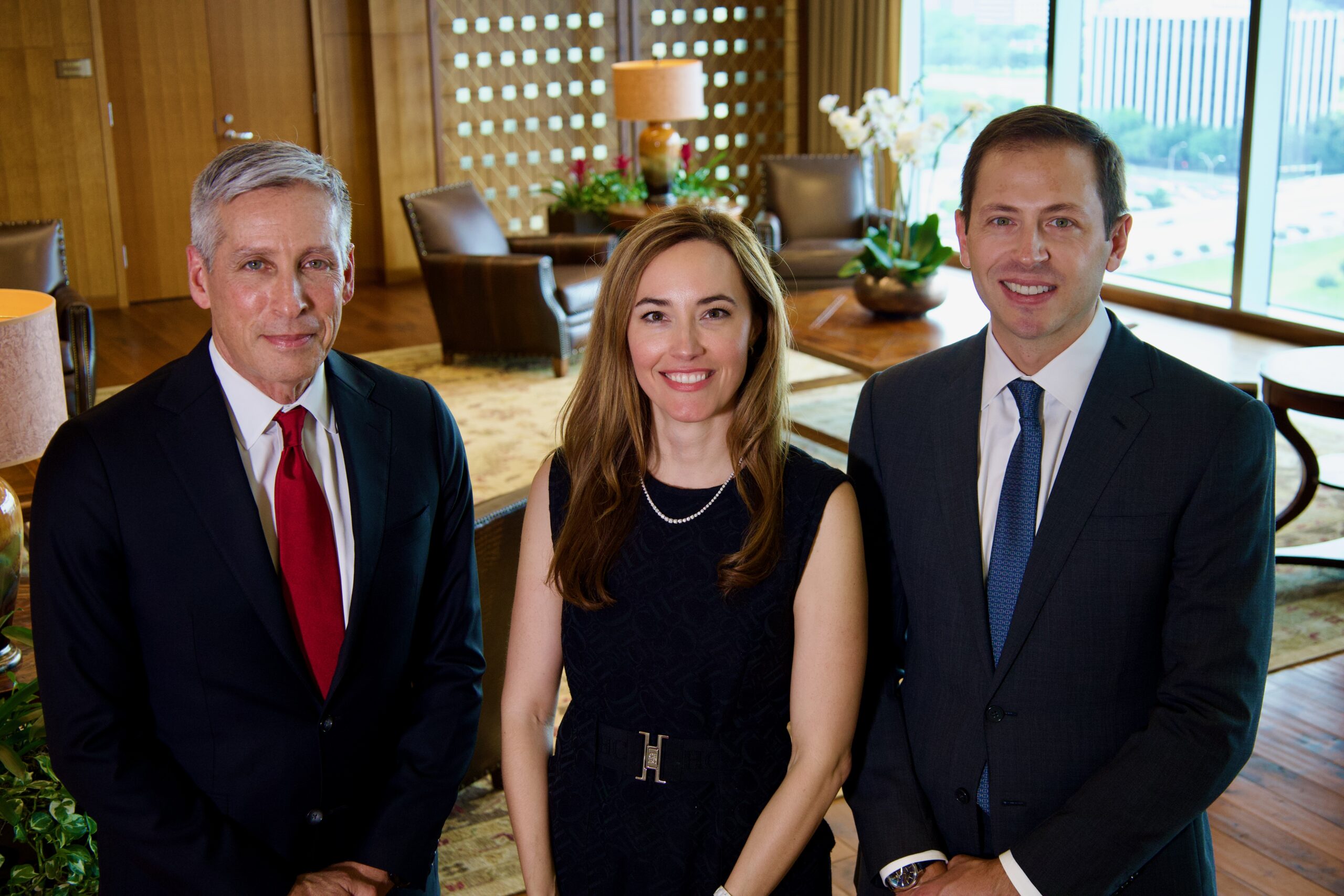When Jenarae Garland arrived as a new managing counsel at Phillips 66 in September 2022, she could be excused for not being fully prepared for the part she would come to play in the $3.8 billion take-private purchase of DCP Midstream LP by her new employer.
She was the junior member of a three-attorney team leading the deal, ranking behind Deputy General Counsel Rob Task and Managing Counsel Maine Goodfellow. By the time Garland arrived, Task had spent nearly 14 years at Phillips, while Goodfellow had spent nearly seven.
Moreover, they were embarking on the second leg of a two-deal makeover of DCP’s ownership which would reconfigure DCP Midstream as a privately owned Phillips subsidiary and blend Phillips 66 into the surge of consolidation of oil and gas operations from the Permian Basin and the Texas-Louisiana Gulf Coast.

From Left: Rob Task, Jenarae Garland and Maine Goodfellow
The transaction resulted in additional adjusted earnings of $1 billion for Phillips 66 by the end of the year. For the in-house trio who led the deal — Task, Goodfellow and Garland — along with their outside counsel Bracewell, it has also resulted in their nomination as finalists for 2024 M&A Transaction of the Year by the Association of Corporate Counsel’s Houston Chapter and The Texas Lawbook.
Bracewell partner Will Anderson, in his nomination of the transaction, notes that the $3.8 billion buyout can only be properly appreciated with understanding the prior transaction that made it possible. Here, a little history may help.
DCP Midstream is a master limited partnership based in Denver. At the end of 2022, it operated 48,000 miles of pipeline and 36 processing plants that sprawl across at least five states. But its ownership structure proved difficult, even by the Byzantine standards of the matryoshka doll partnerships that predominate oil and gas.
Since 2005, its general partner had been owned by a 50-50 joint venture of Phillips 66 and Enbridge, the Calgary-based O&G midstream giant. Any significant changes required the agreement of both.
That changed with the first leg of the DCP Midstream overhaul, which involved a radical realignment. Under that realignment, the companies merged their respective indirect interests in two jointly owned entities: DCP Midstream and Gray Oak Pipeline, an 840-mile connection between the Permian Basin and the terminals at Corpus Christi.
Put simply, Enbridge gained a majority ownership of Gray Oak (from 22.8 percent to 58.5 percent) and Phillips transferred to them what had been its operational control. Phillips, on the other hand, raised their ownership interest in DCP Midstream (from 28.3 percent to 43.3 percent) and Enbridge ceded complete authority to manage its affairs.
But the deal was only half-complete.
The purpose of all this was to integrate DCP Midstream into the existing P66 midstream businesses, a move that would generate incremental EBITDA of as much as $1 billion for Phillips 66 and perhaps $300 million in operational and commercial synergies. To do all that, Phillips announced in January 2023 that it would pay $41.75 for each publicly held unit, boosting its ownership to 86.8 percent.
“The take-private transaction and the realignment transaction each involved a number of complex commercial and legal issues,” said Bracewell’s Anderson. “Taken together, the transactions took place over the better part of two years and involved extensive negotiations – first, between Phillips 66 and Enbridge Inc. to arrive at an economic and governance framework that achieved the objectives of both parties in the realignment transaction, and then between Phillips 66 and DCP Midstream, LP’s conflicts committee to arrive at a price and other deal terms in the take-private transaction.”
The value of the deals can be measured beyond the $1 billion in adjusted EBITDA, said Anderson.
“The transactions have also allowed Phillips 66 to integrate DCP Midstream with its existing midstream business, which is expected to capture at least $300 million of operational and commercial synergies,” Anderson said.
The Players

Behind the deals, of course, were in-house lawyers: Task, Goodfellow and Garland. Anderson credits Task and Goodfellow for both ends of the two-part transaction and Garland for helping them reach the finish line.
They coordinated negotiations, not only with the Phillips 66 business development staff and their in-house lawyers but also with Anderson’s Bracewell team of 23 lawyers in five different offices and a broad range of practice groups.
Task and Goodfellow are no strangers to the ACC awards process. The two in-house lawyers, along with Julie Pradel, were nominated for the same award in 2022. Pradel left Phillips 66 for Chevron in 2023.
Rob Task: High school to corporate leadership
Rob Task was born in Maryland but grew up in Houston. His father was a mechanical engineer. His mom, a nurse.
His go-to high school skillset — reading, writing and communicating — led him to the University of Texas at Austin, but it was one of his professors there, Sarah Weddington, whose Leadership in Government class clinched his decision to study law.
After graduating from South Texas College of Law in 1991, he became deputy general counsel to the governor of Oklahoma, David Walters, whom he describes as a mentor. Working in state government on a variety of major issues involving the legislature and regulatory agencies gave him the breadth of experience he needed to find his own path.
“I determined at that point, my career as a lawyer would be transactional in nature,” he told The Lawbook in 2022.
Task took a series of in-house positions beginning in 1996: to Reliant Energy as senior counsel for four years; 17 months at Dynegy Marketing and Trade as assistant GC, followed by six years as a general counsel at SUEZ Energy and Constellation New Energy.
He joined ConocoPhillips in 2009 as deputy GC for commercial trading. When ConocoPhillips decided to spin off Phillips 66, Task decided to follow.
“I had the choice to stay in the role I was in at COP or take on the challenge of being part of a team standing up a new company and becoming the chief transactional lawyer for Phillips 66,” he said. “Needless to say, I chose the new challenge at Phillips 66 and have been here since its inception in May 2012.”
Maine Goodfellow: Lessons learned
He was born in Montreal, where his father owned a sporting goods company. His mother, an artist, is from Bryan, Texas. His parent met and married in New York before moving to Montreal.
He graduated from the University of Texas School of Law in 2009 after earning a BA in History, Economics and Art at Rice University.
But he cites his clerkship with Judge Michael Keasler at the Texas Court of Criminal Appeals as one of the major influences in his career.
“Although I ultimately pursued a career in a different area of the law, the lessons Judge Keasler taught me about professionalism and ethics have guided me throughout my career.” he told The Lawbook.
Goodfellow sojourned at three law firms — Baker Botts, McDermott Will & Emery and, finally, Bracewell — before he joined Philips 66 in 2015, where he has been managing counsel for nearly three years.
Jenarae Garland: Her best day

She was born and reared in Cypress, Texas. Her mom was a homemaker; her stepdad, a cost engineer.
Like Task and Goodfellow, there were no lawyers in her family. “I remember watching a lot of Matlock with my grandmother when I was little, and I saw lawyers as sophisticated problem solvers which appealed to me,” she told The Lawbook.
Upon graduating from law school at Tulane, she spent nearly three years as an associate at Vinson & Elkins before going in-house at Occidental. But it was at V&E that she found her professional footing. Several women in the capital markets practice group mentored her as a summer associate and later as a junior associate: Danielle Hunter, Ashley Yates, Lande Spottswood, Sarah Morgan and Jen Campbell Cunningham.
“It was my connection with this talented group of women on a personal level that ultimately steered me toward a corporate practice as opposed to litigation, and that really set the trajectory of my career,” said Garland. “They are all excellent teachers and mentors and incredibly talented lawyers.”
She was on maternity leave with her daughter Claire in 2014, with every intention of returning to V&E, she says, when a call from Occidental Petroleum. But after considering the possibility of work-life balance and the potential of working for a new mentor, Nicole Clark, she decided to go in-house.
She spent six years there as a securities counsel before becoming assistant general counsel in November 2020. But after eight years Oxy and a short sabbatical “to refocus on my family,” she felt ready for a new challenge.
She was offered a job at Phillips 66 that she found attractive on paper, but it was her interview with General Counsel Vanessa Sutherland that convinced her to make the move.
“Vanessa has had an interesting career path, serving as in-house counsel and as chairperson of the U.S. Chemical Safety and Hazard Investigation Board and as Chief Counsel at the U.S. Department of Transportation’s Pipeline and Hazardous Materials Safety Administration. Vanessa is not only an excellent lawyer but is also a strategic forward-looking thinker and demonstrated servant leader that prioritizes the success of her team. She is the real deal,” says Garland.
She joined “P66” as managing counsel, SEC and assistant corporate secretary. But as she launched into the rapid-fire demands of the DCP deal, she found herself at first out-of-step.
After nearly eight years at Oxy, she knew her way around a midstream deal, and having seen first-hand the fallout from Oxy’s $57 billion acquisition of Anadarko there would be little awe in a $3.8 billion deal.
But the DCP Midstream transaction had already involved so many people and so many moving parts that just knowing who to see about any particular issue presented its own set of hurdles for the new kid on the block.
“While I felt that I was prepared for this role substantively, I had forgotten the amount of time and effort that it takes to build authentic relationships of trust and respect with co-workers, board members and people that you manage,” she said of those early months. “I think that investing in these relationships is critical to success, but it takes a lot of time and resources to do it effectively.”
She must have learned quickly. The DCP take-private deal was announced in January 2023. And within eight months of her arrival, she was promoted to assistant deputy general counsel. But it was shortly after that promotion that she fully realized that she had finally hit her stride.
“In May 2023, our general counsel was suddenly and unexpectedly unable to attend our virtual annual meeting of shareholders and the board meeting scheduled for later that day,” she said.
“I stepped into her shoes and served as corporate secretary of the meetings, and everything ran smoothly. The executive leadership team and the board gave me kudos for stepping up and it helped me build confidence and demonstrate my value.”
It was, Garland says, her best day at Phillips 66.
